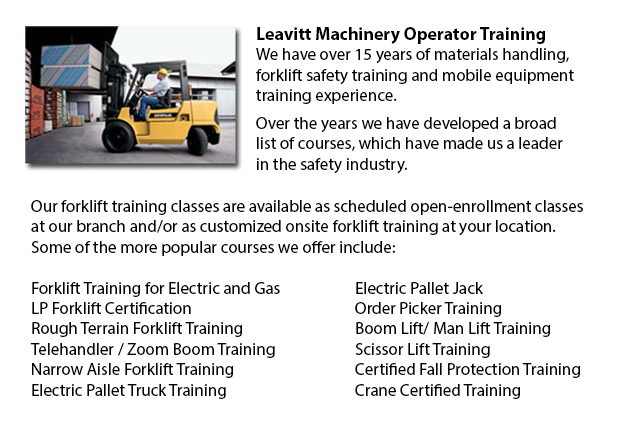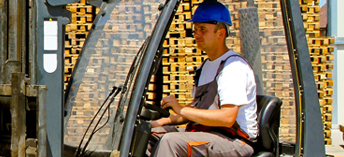
Sudbury Forklift Training Classes - Forklift are heavy pieces of industrial equipments which are utilized in the handling and transporting of merchandise and materials. They are commonly referred to as Lift trucks and are found in all kinds of businesses. Staff working around and with lift trucks need to be trained to recognize hazards associated with the utilization of forklifts.
We offer forklift training classes to be able to teach our trainees how to safely operate a forklift. The theory portion of the course will include classes and instruction on becoming a lift truck operator. Trainees would learn their legal tasks as lift truck operators. Upon completion of the classes, a printed certificate would be issued. The certificate has to be signed by a person qualified to verify that a hands-on evaluation has been done within the workplace of the trainee.
Forklift Safety
Forklift trucks are important in industrial workplaces for their ability to lift and transport heavy loads. Lift trucks are indispensable to various industrial worksites, but lift trucks can be dangerous without properly training personnel. Lift truck injuries, when they occur, tend to be serious because of the power of these heavy machinery. Staff who work often around lift trucks can become complacent and forget the dangers. Essential maintenance and operating procedures may be ignored.
Forklift training is needed not just for new employees. Periodic re-training is vital for all operators. First aid training is important too.
Daily inspection procedures are of critical importance. Forklifts can become damaged if they are not checked regularly. Prior to being utilized, forklifts need to be visually inspected as to their general condition. An operational check has to be carried out to determine the machine is correctly working. The supervisor must be alerted if anything is noted that can impact the safe utilization of the forklift.
Checks must involve inspecting the work place to make certain it is clear of things which might be a concern. Overhead objects and obstructions must be checked too. It is vital to have a working fire extinguisher available and accessible. Various levels must be checked, like for example engine oil, fuel, radiator water, and electrolyte levels in cells. Plugs, batteries and cables must be inspected. Unclog vent caps and ensure that nuts, bolts, chains, guards, and hydraulic hose reels are not damaged, missing or loose. A tire inspection would make certain that wheels are not worn or damaged. Pneumatic tires will require a pressure inspection.
-
Wheel and Track Loader Training in Sudbury
Lift trucks are obtainable in several different models that have different load capacities. The majority of average forklifts used in warehouse environment have load capacities of 1-5 tons. Bigger scale units are utilized for heavier loads, like for... More -
Sudbury Aerial Lift Certification
Sudbury Aerial Lift Certification - Aerial Lift Certification is for individuals who requires an in-depth understanding of aerial lift safety. Inspectors and operators, supervisors, maintenance workers and construction craftsmen must perform a traini... More -
Sudbury Forklift Certification Schools
Sudbury Forklift Certification Schools - Within North America, forklift certification is mandatory, making forklift training programs necessary for both the company and their employees working as forklift operators. Forklift training focuses on healt... More -
Sudbury Boom Lift Operator Training
Sudbury Boom Lift Operator Training - A cherry picker refers to a type of aerial work platform. Cherry pickers include a platform or bucket at the end of a hydraulic lifting system. The device is likewise called a man lift, boom lift, basket crane or... More -
Sudbury Telehandler Certification
Sudbury Telehandler Certification - Telehandler certification programs are both for operators who have some experience driving a standard forklift and for those with no experience. The real-world training offered by these courses produces graduates w... More -
Operator Safety Training, Re-Qualification Training, In-House Instructor Training in Sudbury
Lift trucks are utilized in just about all industrial construction sites and in warehouse operations and in boat yards. The reach feature of a lift truck is a vital component used in several applications like for example when a shelving system is bei... More -
Crane / Overhead Crane / Self-Erect Crane / Truck Mounted Crane / Hydraulic Cranes Training in Sudbury
Bridge cranes or overhead cranes are a type of industrial material handling crane making use of a line and hook apparatus which runs on a horizontal beam running along two widely separated rails. Lots of overhead cranes could be seen in a long factor... More -
Sudbury Forklift Safety Training
Sudbury Forklift Safety Training - Anyone who wants to operate a lift truck should take a forklift safety training course in order to become a certified forklift truck operator. There are a variety of ways to obtain forklift training. Programs are pr... More

Forklift Certification Sudbury
TOLL FREE: 1-888-254-6157
Sudbury, Ontario
forkliftcertificationsudbury.com
Email Us
About Us


